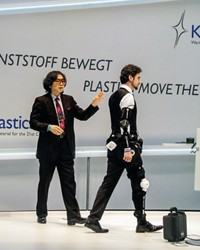Advertisement
Grab your lab coat. Let's get started
Welcome!
Welcome!
Create an account below to get 6 C&EN articles per month, receive newsletters and more - all free.
It seems this is your first time logging in online. Please enter the following information to continue.
As an ACS member you automatically get access to this site. All we need is few more details to create your reading experience.
Not you? Sign in with a different account.
Not you? Sign in with a different account.
ERROR 1
ERROR 1
ERROR 2
ERROR 2
ERROR 2
ERROR 2
ERROR 2
Password and Confirm password must match.
If you have an ACS member number, please enter it here so we can link this account to your membership. (optional)
ERROR 2
ACS values your privacy. By submitting your information, you are gaining access to C&EN and subscribing to our weekly newsletter. We use the information you provide to make your reading experience better, and we will never sell your data to third party members.
Environment
Repairing the health of our planet will be the focal point of the next decade
by Bibiana Campos Seijo
January 5, 2020
| A version of this story appeared in
Volume 98, Issue 1
Welcome to a new year and a new decade. C&EN would like to wish you a joyful and prosperous 2020.
The 2010s are out, and overall I’d say that the past decade was a positive one in terms of the public perception of chemistry. Events like the International Year of Chemistry in 2011 and the International Year of the Periodic Table in 2019 provided chemistry enthusiasts with opportunities to shine a light on our profession and galvanize communities to celebrate and elevate the crucial role that the chemical sciences play in improving people’s lives.
The 2020s are here, and we’re starting the decade with a momentum that will only accelerate toward achieving the United Nations sustainable development goals (SDGs). You probably heard more about them during 2019 than before, as Google launched an accelerator program to support start-ups striving to drive progress on the SDGs; DuPont aligned its innovation portfolio to advance the SDGs; and Unilever, Nike, Coca-Cola, and 14 other companies created a coalition to focus on how businesses can help meet the 17 SDGs.
There is no doubt that the SDGs will become an important theme and focus for chemists’ work over the next few years as we approach the 2030 deadline. But we start the decade with a real sense of urgency with respect to SDGs related to environmental protection and repairing the earth. For many, this is the dominant scientific issue of our time, and it is likely to prevail for decades to come, beyond our lifetimes.
German chancellor Angela Merkel, the longest-serving incumbent head of government in the European Union and one of the most influential political figures of the 21st century, said as much in her New Year’s address: “I, as a 65-year-old, will not personally experience all of the consequences that climate change will bring if politicians do not act,” but coming generations will “live with the consequences of what we do or fail to do today.”
Merkel, who has a doctorate in physical chemistry, chose to put climate front and center of her 5 min speech and urged leaders to take action. “We need, now more than ever, the courage to think in new ways, the strength to leave well-trodden paths, the readiness to venture into new territory and the resolve to act more quickly . . . if a good life on this planet is to be possible for today’s young people and those who come after them,” she says.
This came on the heels of the announcement of the launch of a new environmental prize by the Duke of Cambridge. The Earthshot Prize seeks to “encourage and inspire people across the world to find innovative new solutions to one of the gravest problems facing the Earth,” according to the Telegraph. Its name is a reference to the moon shot program announced in 1961 by John Fitzgerald Kennedy, who challenged the US to land astronauts on the moon’s surface before the end of the decade. The Earthshot Prize hopes to galvanize a decade of action to repair the planet.
The prize comes with a multimillion-pound award to be given to five winners per year over 10 years. For the launch, the Duke of Cambridge joined forces with British broadcaster and natural historian Sir David Attenborough, who narrated the video that broke the news about the award. In it, Attenborough recognizes the power of human invention and how it is going to be crucial to navigate the challenges we’ll face this next decade as we strive to repair our planet. “Humans have an extraordinary power to solve the greatest of challenges. We invent, navigate, see, cure, travel, move, participate, demonstrate,” he says. JFK’s voice strengthens that belief with his now-famous quote: “We do these things not because they are easy but because they are hard.” He made the moon shot a reality; we can make the Earthshot a reality, too.




Join the conversation
Contact the reporter
Submit a Letter to the Editor for publication
Engage with us on Twitter